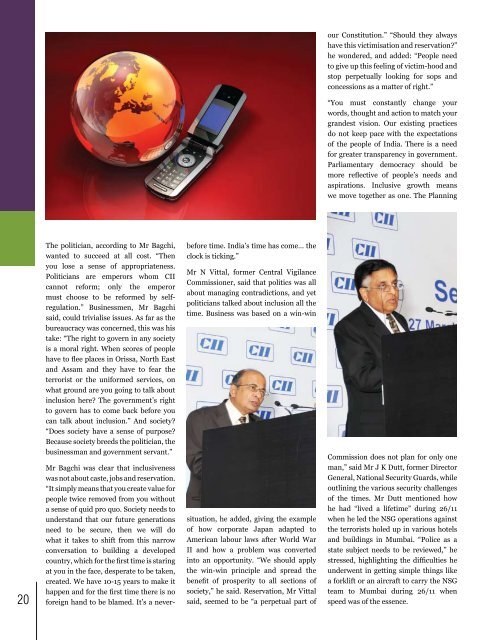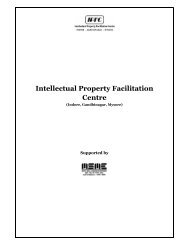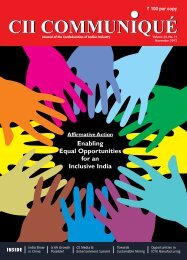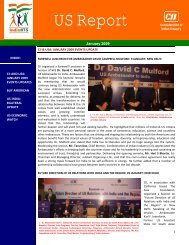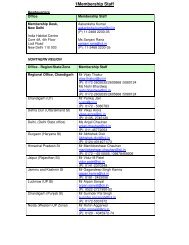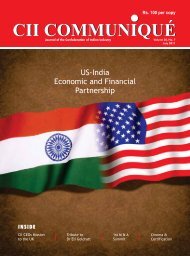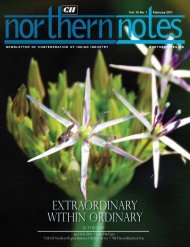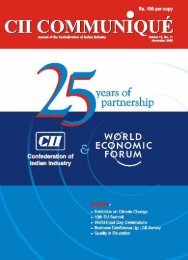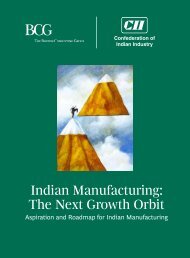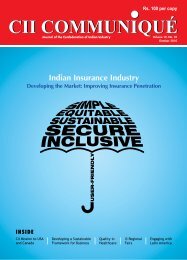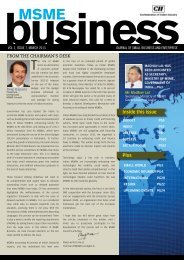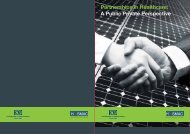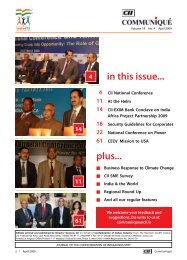our Constitution.” “Should they alwayshave this victimisation and reservation?”he wondered, and added: “People needto give up this feeling of victim-hood andstop perpetually looking for sops andconcessions as a matter of right.”“You must constantly change yourwords, thought and action to match yourgrandest vision. Our existing practicesdo not keep pace with the expectationsof the people of India. There is a needfor greater transparency in government.Parliamentary democracy should bemore reflective of people’s needs andaspirations. Inclusive growth meanswe move together as one. The Planning20The politician, according to Mr Bagchi,wanted to succeed at all cost. “Thenyou lose a sense of appropriateness.Politicians are emperors whom <strong>CII</strong>cannot reform; only the emperormust choose to be reformed by selfregulation.”Businessmen, Mr Bagchisaid, could trivialise issues. As far as thebureaucracy was concerned, this was histake: “The right to govern in any societyis a moral right. When scores of peoplehave to flee places in Orissa, North Eastand Assam and they have to fear theterrorist or the uniformed services, onwhat ground are you going to talk aboutinclusion here? The government’s rightto govern has to come back before youcan talk about inclusion.” And society?“Does society have a sense of purpose?Because society breeds the politician, thebusinessman and government servant.”Mr Bagchi was clear that inclusivenesswas not about caste, jobs and reservation.“It simply means that you create value forpeople twice removed from you withouta sense of quid pro quo. Society needs tounderstand that our future generationsneed to be secure, then we will dowhat it takes to shift from this narrowconversation to building a developedcountry, which for the first time is staringat you in the face, desperate to be taken,created. We have 10-15 years to make ithappen and for the first time there is noforeign hand to be blamed. It’s a neverbeforetime. India’s time has come… theclock is ticking.”Mr N Vittal, former Central VigilanceCommissioner, said that politics was allabout managing contradictions, and yetpoliticians talked about inclusion all thetime. Business was based on a win-winsituation, he added, giving the exampleof how corporate Japan adapted toAmerican labour laws after World WarII and how a problem was convertedinto an opportunity. “We should applythe win-win principle and spread thebenefit of prosperity to all sections ofsociety,” he said. Reservation, Mr Vittalsaid, seemed to be “a perpetual part ofCommission does not plan for only oneman,” said Mr J K Dutt, former DirectorGeneral, National Security Guards, whileoutlining the various security challengesof the times. Mr Dutt mentioned howhe had “lived a lifetime” during 26/11when he led the NSG operations againstthe terrorists holed up in various hotelsand buildings in Mumbai. “Police as astate subject needs to be reviewed,” hestressed, highlighting the difficulties heunderwent in getting simple things likea forklift or an aircraft to carry the NSGteam to Mumbai during 26/11 whenspeed was of the essence.
A call for good governance,transparency, accountabilityTalking about ‘Corporate Governance– The Leadership Challenges& Opportunities’ at Innovision<strong>2010</strong>, Mr Salman Khurshid, UnionMinister of State for Corporate Affairsavnd Minority Affairs, said that corporategovernance had evolved – from controlto regulation and now, to lightenedregulation. Mentioning the specialsense of purpose, accomplishmentand determination he had felt whenhe arrived in Chennai, Mr Khurshidto bring it out from obscurity, makeit explicit, stark in black and white,”he said. Touching upon the aspects ofaccountability, transparency, disclosureand participation (voting in elections)Mr Khurshid said corporate governancehad to be about enhancing democracyand protecting minorities, partly bygiving them greater say.Moving on to the aspect of independentdecision-making, the Minister was forcoming together of corporate governanceand corporate social responsibility (CSR)and inclusiveness, in terms of greaterparticipation of the average Indian. “Weneed to talk in a language the averageIndian understands. This is not justfor some people in a hall who are wellversedwith all this. For example, thelink between corporates and farmersmust go beyond contract farming. Weneed to bring the Indian farmer into thecorporate way of thinking. That will bethe real success.”felt that corporate governance in its‘lightened regulation’ form was essentialin a free society. “We cannot dictate;in a liberal society we have to have atheory of mistake as well. But correctivemeasures have to be taken and societycompensated for mistakes made. Eventslike this will help us refine our thoughtprocesses,” he said.Corporate governance, Mr Khurshidstressed, was no different from goodgovernance in society. “The RTI Actis embedded in our Constitution, notnecessarily explicit; like Article 21, theRight to live with dignity. We are tryingcreating a gene pool of independentdirectors, people not beholden to anybody.“There is no standard formula applicableall over the world. Families have foundways of institutionalising corporategovernance,” he said. He pointed tonomination (of directors), remunerationand audit as three areas that neededindependent and objective assessmentwithin the company. Indirectly referringto the Satyam disaster (of governance),he said: “Government and industry haveto find solutions with an open mind. Weare not influenced by one black sheep.”Earlier, Mr Kris Gopalakrishnan, DeputyChairman, <strong>CII</strong> (Southern Region), saidcorporate governance was a cause <strong>CII</strong>had been championing for long – from1998. <strong>CII</strong>, he added, had released a setof recommendations in November 2009,building on which the Ministry hadalso released guidelines, the followingmonth. He was of the view that discourseand debate were needed for voluntaryadoption of better practices. “The Satyamfiasco led to concern about IT practices.Infosys, with <strong>CII</strong> and NASSCOM, quicklyput together a code of conduct for theindustry. Satyam was seen as a one-offthanks to corrective measures taken andproactive government intervention,” hesaid.This article has been brought out by <strong>CII</strong>based on the deliberations at Innovision<strong>2010</strong>– A session with Visionary LeadersMr Khurshid also spoke about the held in Chennai on 27 March <strong>2010</strong> 21
- Page 1: Quarterly Newsletter from CII (Sout
- Page 5 and 6: Chairman’s Messageear Reader,It i
- Page 7 and 8: In September 2007, CII in partnersh
- Page 9 and 10: and at affordable prices, not reser
- Page 11 and 12: CII Southern Region Annual DaysAnnu
- Page 13 and 14: Kerala - Global Health Challenges -
- Page 16 and 17: TRICHY TRIVANDRUAM VIZAGVIJAYAWADAC
- Page 19: How mobile phones, micro-financehav
- Page 23 and 24: Business Consulting Services, USA g
- Page 25: One second, one small step canmake
- Page 28 and 29: Securing Business and BeyondNo more
- Page 30 and 31: 30past 10 years, according to him,
- Page 32 and 33: In today’s world, ‘intelligent
- Page 34 and 35: Mr Ashish Sonal, Founder & CEO, Ork
- Page 36 and 37: 36emergency response team-India) is
- Page 38 and 39: and pass the same for obtaining anI
- Page 40 and 41: Kerala Ayurveda Scenario3. Kerala,
- Page 42 and 43: Scaling Up : A few initiatives8. Va
- Page 44 and 45: CSR CornerSneham - The CSR Wing of
- Page 46 and 47: “Become a Santa” InitiativeSNEH
- Page 48 and 49: Deccan DoingsRegional, State & Zona
- Page 50 and 51: State ActivitiesAndhra PradeshSeven
- Page 52 and 53: CII - Andhra Pradesh Tata DocomoCri
- Page 54 and 55: KeralaOne-Day Attitudinal Seminar o
- Page 56 and 57: Job Opportunities Session18 April 2
- Page 58 and 59: Study Mission on Total EmployeeInvo
- Page 60 and 61: Awareness Programmeon SEDEX & C-TPA
- Page 62 and 63: CII “ERA” (EmpoweringRural Area
- Page 64 and 65: In FocusBuilding MSMEs in the Regio
- Page 66 and 67: and services, investment by small a
- Page 68 and 69: Young IndiansBANGALOREA Transformat
- Page 70:
CII Southern Region NetworkSouthern


